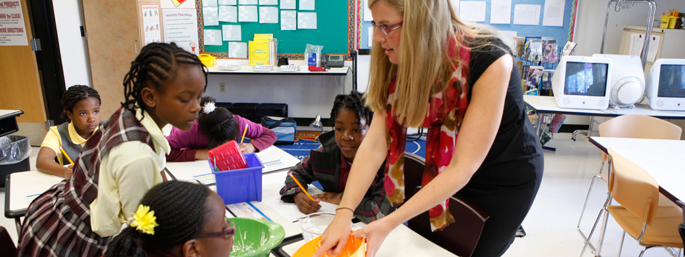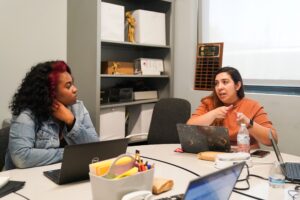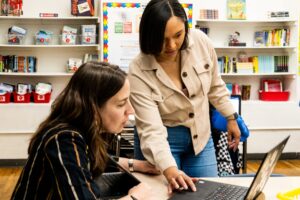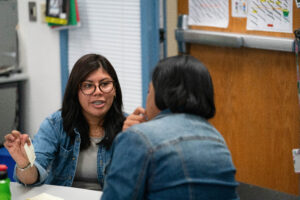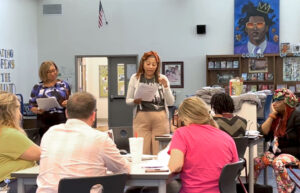If you ask a teacher what it was like to plan lessons in the early days of his or her career, you’re likely to hear some version of this:
“It was two in the morning and I found myself on the floor of my apartment desperately searching for a good text/stuffing hand-cut math manipulatives into baggies/creating a third draft of my guided notes/Googling graphic organizer templates. I was a zombie the next day—a zombie with very expensive 24-hour Kinko’s copies.”
I can laughingly tell my own version of this tale now that the actual trauma of the experience is safely behind me (picture me in sweatpants in the middle of the night, standing at the copy counter, hand-drawing annotation and active reading bubbles on photocopied reading passages while the clerk just stared), and I think like many teachers, I even take some pride in having survived it. Late-night lesson planning and wee-hours copy runs are almost rites of passage for new teachers.
But as satisfying as those war stories may be now, the hard truth is that nobody does their best work in the classroom when they were up half the night trying to figure out the best way to teach fractions (or lead a close reading or incorporate real-world problems into class). That was definitely my experience as a new teacher years ago, and I see it now with our Teaching Fellows, whose training I help create. Almost every teacher I know shudders to think of the ill-conceived and untested lessons they planned (and taught!) during their first year—a time when they were already working incredibly hard to figure out the basics, like giving clear directions to get students on task and using behavior narration to keep them there.
This problem left us wondering: why do we ask new teachers to invent so much of what they teach? What if they started with good units, assessments and lessons in hand, and focused on how to deliver those lessons, instead designing their own from scratch? What if 2:00 AM lesson planning became a thing of the past?
Thinking Inside the Box
We were inspired by the promising results we saw at Uncommon Schools, a fantastic group of charter schools with which we’ve partnered over the past two years to transform the way we train Fellows, as well as at Match Teacher Residency. Both organizations have provided their new teachers with prepared units, lessons and assessments, sometimes called curriculum in a box, and we resolved to test this approach at three of our pre-service training institutes this summer, in New Orleans, Nashville and Arizona. Our hypothesis was that providing curriculum materials would allow our Fellows to get better quicker, because they would have more cognitive space and energy to do the work. Meanwhile, they would learn about rigorous and effective instruction by delivering it.
Our Fellows have been using these materials as the starting point for their instruction during the past two months, and the early results are promising. In my classroom visits this summer, I saw many more teachers working toward rigorous objectives and engaging their students in high-quality academic work. I observed students citing evidence from texts to support their own written arguments in an elementary writing class, and kids calculating and interpreting unit rates from tables, graphs, equations and verbal expressions in a middle school math lesson.
These classrooms were not isolated bright spots; overall, we are seeing higher-quality instruction from new teachers than we have ever seen in the past. When Uncommon’s Doug Lemov and Erica Woolway visited Nashville recently to give us feedback, they agreed that the prepared lessons were a game-changer for Fellow performance. In one focus group we conducted, we talked to a Fellow who was teaching math but never felt it was her strongest subject. She told us that every night, she completed the provided guided notes and exit ticket for the lesson the next day, figured out exactly what she didn’t know so that she could brush up on it, and practiced delivering the lesson. This allowed her to teach with the confidence of a math expert, even if she never would have characterized herself that way in the past.
Big Questions
We’re still grappling with some important questions about curriculum in a box, and we have plans for more extensive data collection and analysis well into the school year. I anticipate a lively debate.
One of the core critiques is something along the lines of, “Give a teacher a lesson plan, and he can teach for a day. Teach a teacher how to lesson-plan, and he can teach for a lifetime.” It’s an important point, because right now, we can’t provide every Fellow with a successful plan for every class, every day. Very few of our teachers will enter schools where the curriculum will be provided, and many of them will be in schools where a locally required scope and sequence won’t match up to any premade materials we could provide.
Our Fellows do get intensive training in lesson planning before the school year begins, and coaching throughout their first year. But questions remain. Will they have learned enough by delivering good instruction to take over planning it themselves by the start of the school year? How can we help Fellows emulate successful lessons they have led? To what extent would it make sense to double down on curriculum in a box and ensure every Fellow has access to solid foundational curricula for the school year? Will the Common Core make providing school-year curriculum more feasible and practical nationally?
As we work through the questions, I intend to keep this image in mind: a brand-new teacher waking up refreshed, with her copies made, excited to teach a truly great lesson to her students. I’ll be working on this problem for her.
